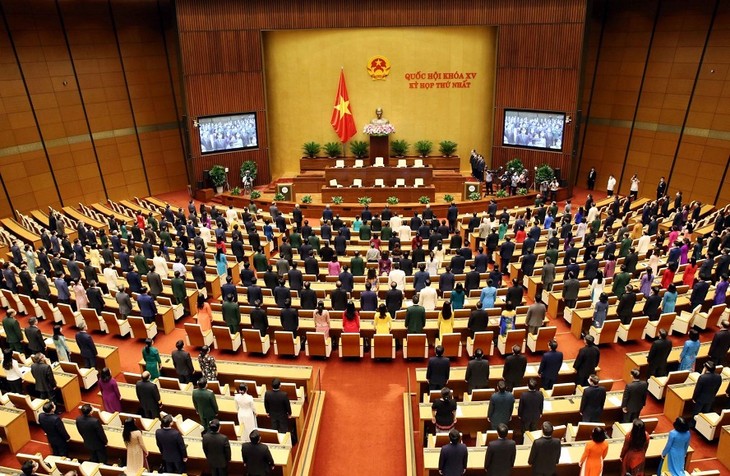(VOVWORLD) - Building a serving, modern, transparent, and open administrative system is part of the effort to build a Vietnamese law-governed socialist state by 2030 (with orientation to 2045). Efforts have been made to improve national governance.
 At the first session of the 15th National Assembly (Illustrative photo) At the first session of the 15th National Assembly (Illustrative photo) |
Many prestigious international organizations have lauded Vietnam's recovery and development achievements since the two years of economic setbacks due to the COVID-19 pandemic. Standard Chartered Bank has forecast GDP growth for Vietnam of 10.8% in Q3 and 3.9% in Q4, and 6.7% for the whole year. HSBC recently raised Vietnam's growth forecast in 2022 from 6.6% to 6.9%.
Vietnam’s strong growth can be attributed to the leadership of the Party, public consensus, and especially the government’s effective management during the recent turbulence.
Professor Dr. Phan Xuan Son of the Ho Chi Minh National Academy of Politics said: "The international community and organizations highly appreciate the Vietnamese Government’s management. The government performed well in a difficult context – the COVID-19 pandemic. Our growth rate has never been negative. The lowest was more than 2%. The Government has been very dynamic, flexible, and creative.”
The governance is a solid base for building and perfecting the state administrative system for a law-governed state. To this end, executive agencies need to restructure and reform their operation to become more effective and the state administrative system needs to be reformed toward rule-based democracy and become modern, professional, pure, transparent, and strong to better serve the people. It’s important to build a working, righteous government.
Professor Hoang The Lien, former Deputy Minister of Justice, said: “The idea of facilitating development is a breakthrough mindset. The State needs to strengthen reform to better perform while promoting transparency and accountability.”
Strengthening power delegation is among the government’s tasks to build a law-governed State.
Prime Minister Pham Minh Chinh said: "It’s important to strengthen power delegation, individualize responsibility, improve capacity, and enhance coordination, inspection, and control of power. We need to bring into play our role, dynamism, and creativity, promote incentives, and protect innovative and creative cadres who dare to think and take action for the public interest.”
Publicity, transparency, and accountability are the main criteria of a law-governed state, the features of the Vietnamese law-governed socialist State of the people, by the people, and for the people, and a reflection of the people’s right to mastery and oversight of the state’s operation.
Professor Hoang The Lien said: “Our law clearly stipulates each person’s responsibility. Accountability makes clear the responsibility of each individual and organization. We promote democracy but at the same need to uphold individual responsibility.”
Building a democratic, professional, modern, people-centered administrative system inspected by the people and measured by the people’s satisfaction will make the State apparatus more effective.
Professor Tran Ngoc Duong, Head of the Advisory Council of Democracy and Law of the Vietnam Fatherland Front, said: “We need to build a strong mechanism for people to control the power. In the meantime, we need to build a Law on Inspection and Social Argument to engage all individuals and organizations in power control. In the context of a single ruling party, the mechanism for the people to control the state power is very important.”
The 13th National Party Congress said one of the most fundamental solutions for building and fine-tuning a law-governed socialist State is to identify the role, position, function, task, and authority of state agencies in exercising legislative, executive, and judicial rights on the principle of ensuring law-based, unified state power, clear delegation and authorization of power, and close coordination.